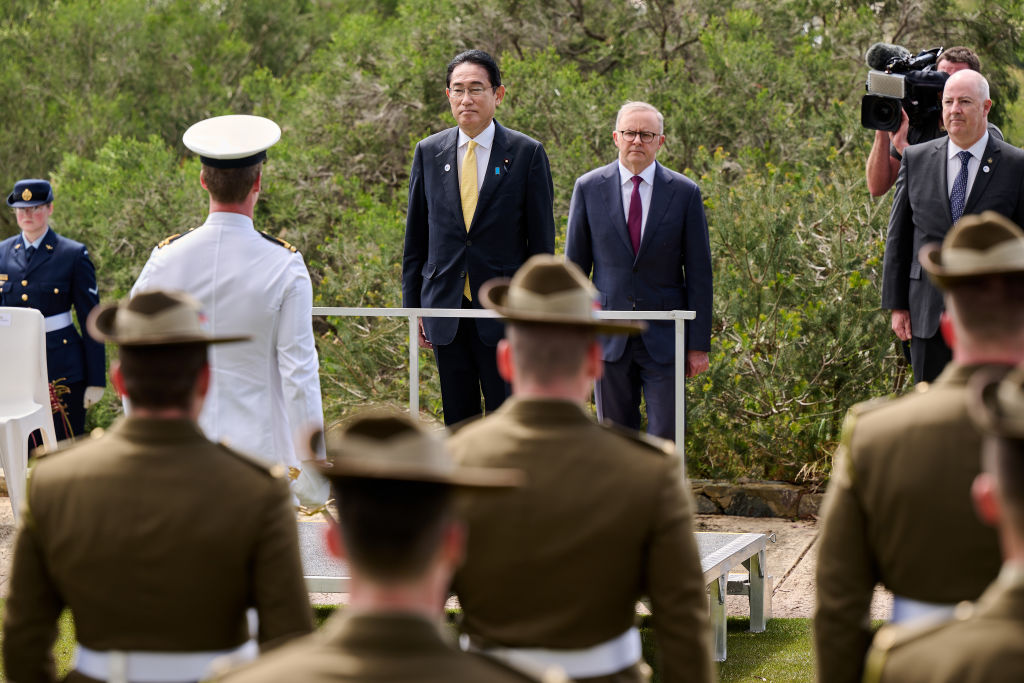Cementing Australia–Japan ties: Japan’s National Institute for Defense Studies marks 70 years

This year witnessed another milestone in the Australia–Japan ‘special strategic partnership’ as prime ministers Anthony Albanese and Fumio Kishida met in Perth on 22 October to issue a new joint declaration on security cooperation. This update of the two countries’ foundational 2007 declaration further cements their strategic collaboration in the face of a deteriorating regional security landscape in the Indo-Pacific.
Coincidentally, 2022 is also the 70th anniversary of the National Institute for Defense Studies (NIDS), a think tank in Japan that serves as an important strategic dialogue partner for Australia as bilateral ties continue to deepen and expand. It’s worthwhile taking this anniversary as an opportunity to familiarise readers with the remit and activities of Japan’s only national research and educational institute concerned with security to showcase their relevance to the strategic community in Australia.
Located within the Ministry of Defense compound in the Ichigaya district of central Tokyo, NIDS conducts research and educational activities related to security, strategic and defence affairs, with an in-house staff of experts numbering around 90 researchers, under the direction of its president, Masahiro Kawasaki. It is divided into departments for policy studies, security studies and regional studies. It also houses the Center for Military History, a collection of around 167,000 volumes of official documents relating to the former Japanese Army and Navy since the Meiji period, with a reading room allowing access by the public.
NIDS carries out extensive research activities and publishes its findings (in English and Japanese) across a variety of venues. Most prominent among these are its annual East Asian Strategic Review, which complies analysis of key strategic events and trends and serves as a valuable resource for anyone with a serious interest in contemporary security and defence affairs. Shorter publications of interest to the strategic community in Australia and elsewhere include the in-house journal Security and Strategy and NIDS commentaries, as well as a dedicated YouTube channel, with more than three million subscribers.
Given widespread concern over the assertive strategic posture China has assumed in the region, NIDS’s annual China Security Report is also an invaluable resource for China watchers, providing a digest and analysis of the latest developments in Chinese security policy. With contributions by NIDS experts and renowned international contributors, the reports cover a variety of important topics, including China–Taiwan relations, US–China relations, the sea and land aspects of China’s Belt and Road Initiative, and the Chinese military’s activities in new security domains and joint operations. China’s Ministry of National Defense has taken note of the report.
Russia’s war on Ukraine has not escaped attention in Japan and is credited by many as galvanising public opinion behind government plans to further expand the country’s defence capabilities. NIDS has played an important role in contributing to domestic debates on the lessons of the Ukraine war through the release of a special report examining the war from the multiple perspectives of Australia, Russia, the United States, China and Southeast Asia. The report attracted significant attention and raised the visibility of NIDS as an institution domestically.
NIDS also plays a vital role in training future national security leaders by offering courses for senior officers of the Ministry of Defense and the Japan Self Defense Forces. Trainees of NIDS include officers posted to embassies abroad, including Australia, to serve as military attachés. NIDS also provides briefings for Japan’s national security secretariat and members of the Diet. Its international exchange department hosts a roster of workshops and symposia, such as the NIDS International Symposium on Security Affairs, and welcomes overseas visitors who come to interact with local experts. NIDS also has a policy simulation division that conducts training for the Ministry of Defense and the Self-Defense Forces and for projects with ASEAN countries through Japan’s ‘Vientiane Vision’ for defence cooperation.
As Australia–Japan security cooperation evolves, NIDS is deepening its engagement with the Australian strategic community, and NIDS’s educational programs have hosted senior officers from the Australian Defence College. NIDS is also promoting personnel exchanges with overseas think tanks such as ASPI (including both authors of this post). Such exchanges will make a significant contribution to creating a shared strategic awareness of the Australia–Japan relationship. A decade ago, NIDS and the Australian National University published a joint study on Australia–Japan security cooperation. Its recommendations that Australia and Japan translate ‘talk’ into ‘action’ appear to have been borne out by subsequent augmentation of the bilateral relationship.
With Australia and Japan so closely aligned in their strategic perceptions of the risks to peace and stability in the Indo-Pacific brought about by the actions of China, North Korea and Russia, enhanced interaction between organisations such as NIDS and ASPI further cements bilateral ties between the strategic communities that are essential to deepening our understanding of the scope and nature that the special strategic partnership is assuming and the challenges it faces. Every channel of communication and consultation serves to layer and reinforce the close relationship that has been painstakingly built to date.
With Tokyo expected to release three major security policy documents at the end of this year, including the national defence program guidelines, the midterm defence program and, most importantly, a new national security strategy, following close on the heels of the US version, attention in in Australia is firmly focused on Japan. NIDS will continue to play a major role in communicating developments in Japanese and regional security affairs to an international audience in Australia and beyond based on its 70-year track record.